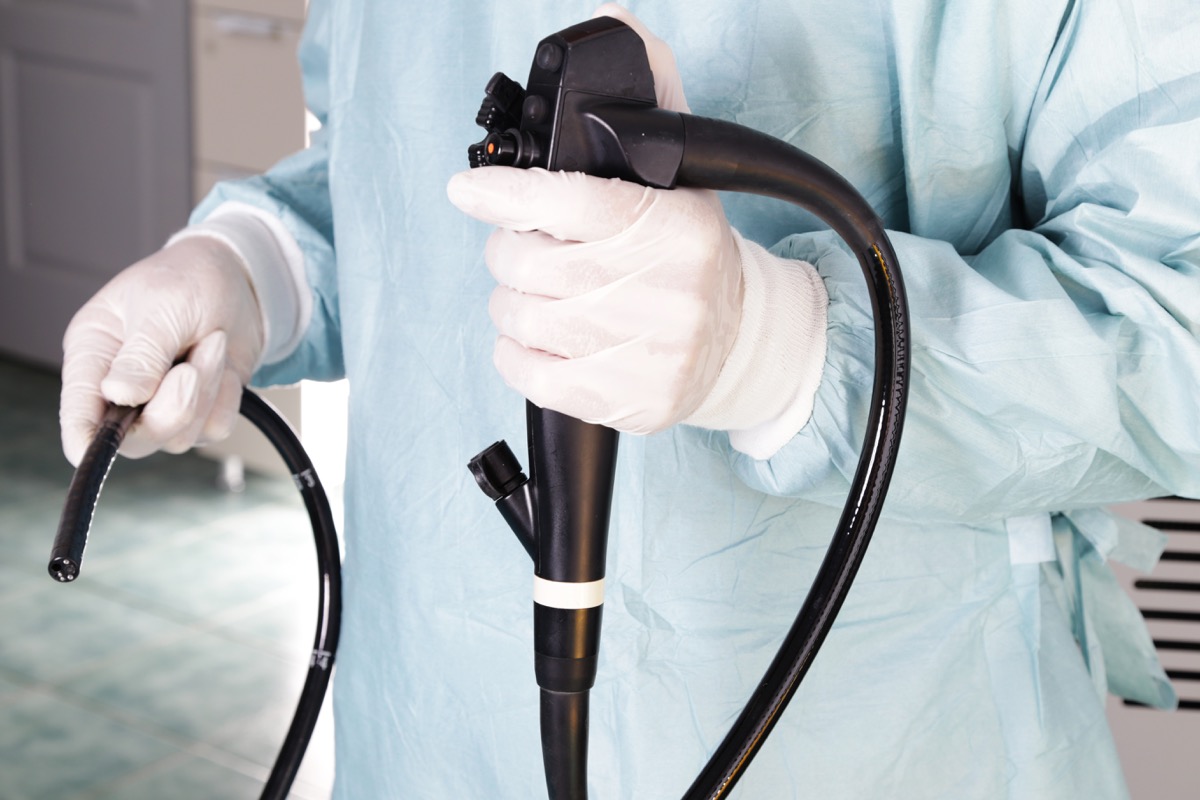New Study Says You May Not Need a Colonoscopy Every 10 Years, But Not All Doctors Agree

Each year, roughly 150,000 Americans are diagnosed with colorectal cancer. Though the statistic may be stark, it also marks a significant decrease in overall cases since the 1980s, thanks in no small part to the widespread adoption of the colonoscopy and other screening tools.
Colonoscopies can help prevent colorectal cancer by detecting it in its precancerous stage, the Centers for Disease Control and Prevention (CDC) explains. “Colorectal cancer almost always develops from precancerous polyps (abnormal growths) in the colon or rectum. Screening tests can find precancerous polyps, so that they can be removed before they turn into cancer,” the health authority notes.
But just how often should you get a colonoscopy? Though a new study says that select groups may not need to undergo the procedure every 10 years, not all doctors agree. Read on to learn why colonoscopies are as important as ever, according to two top experts in the field.
READ THIS NEXT: Men Who Eat This Are at 29 Percent Higher Risk of Colorectal Cancer, New Study Finds.
Two-thirds of people who need colonoscopies are up to date on screening.

Since the mid-1990s, doctors have recommended that adults over the age of 50 undergo regular colonoscopies to screen for colon cancer, polyps, and other abnormalities. Today, the Centers for Disease Control and Prevention (CDC) recommends that everyone between the ages of 45 and 75 should undergo colorectal cancer screening, which may include stool tests, flexible sigmoidoscopy, and CT colonography.
Though many of these tests are administered every five years, most doctors say that colonoscopies should be performed every 10 years. However, according to a 2018 study published in the journal Cancer Epidemiology, Biomarkers & Prevention, just 67 percent of Americans over the age of 50 were considered up to date with screening.
READ THIS NEXT: The “Controversial” Way Ben Stiller Learned He Had Cancer.
A new study says you may not need a colonoscopy every 10 years.

Though the current guidelines say you should plan on getting a colonoscopy every 10 years, a Jan. 2023 study published in JAMA Internal Medicine suggests that some individuals who have had negative colonoscopy results in the past may be able to extend the time between screenings.
In particular, after reviewing data from 120,098 German subjects, the study authors noted that advanced neoplasms were at least 40 percent less likely to be discovered in women than in men. They also found that prevalence was especially low in those under the age of 75 who had received negative colonoscopy results within 10 years prior. This led the research team to conclude that “women at younger screening ages with no finding at index colonoscopy could possibly be screened at prolonged intervals or, alternatively, be offered less invasive methods, such as stool tests, while maintaining the 10-year interval for men and women at older ages.”
However, not all doctors agree.

Despite the study’s findings, some doctors say it would be premature to make any changes in practice, and urge older adults to continue getting colonoscopies every 10 years.
“The most important piece of information from this large study out of Germany is the effectiveness of a repeat colonoscopy 10 years after the prior one that showed neither cancer nor polyps,” says Xavier Llor, MD, PhD, Medical Director of the Colorectal Cancer Prevention Program at the Yale School of Medicine. “These patients remained at relatively lower risk for advanced polyps and cancer in 10 years. In this sense, this is confirming current approved guidelines,” he tells Best Life.
Some experts advocate for even earlier and more frequent screening.

In fact, more frequent screening could be broadly beneficial, says Gary H. Hoffman MD, FACS, an attending surgeon and Vice Chief of Staff at Cedars Sinai Medical Center. “A colon exam of some type should be performed every five years,” the doctor, who is also a senior associate at Los Angeles Colon and Rectal Surgical Associates, tells Best Life. “Virtual colonoscopy (a CT scan) and barium enema (an X-ray) are two types of colon exams and are recommended to be performed every five years.”
This type of frequent screening is already considered common among individuals who have a family history of colorectal cancer or colorectal polyps, as well as those with a personal history of certain health conditions. These include inflammatory bowel disease such as Crohn’s disease or ulcerative colitis, the genetically inherited syndrome familial adenomatous polyposis, and lynch syndrome.
However, Hoffman believes that colonoscopies are underused in lower risk individuals. “Although a colonoscopy is ‘recommended’ every 10 years, this ignores basic polyp and tumor biology and a colonoscopy, like the other examinations, should be performed every five years,” he says. “The rate of colon cancer has been decreasing because of our aggressive screening modalities. As we say in the industry: ‘The best way to cure colorectal cancer is to prevent colorectal cancer.'”